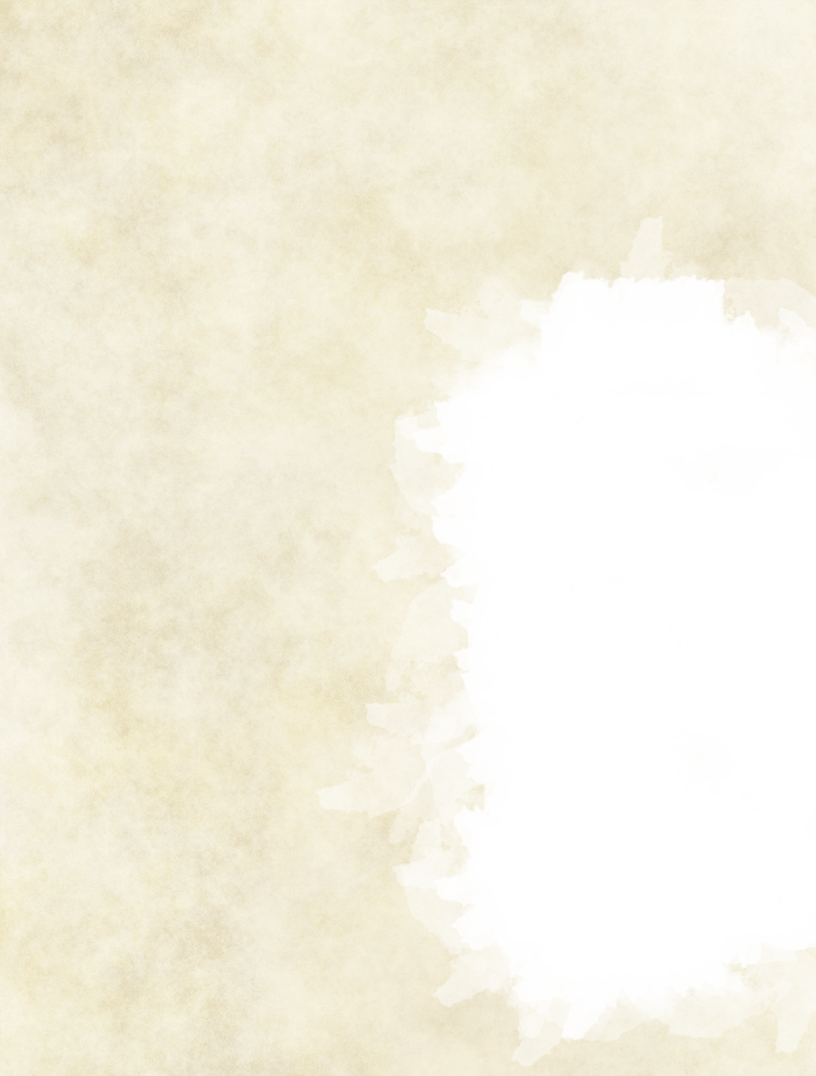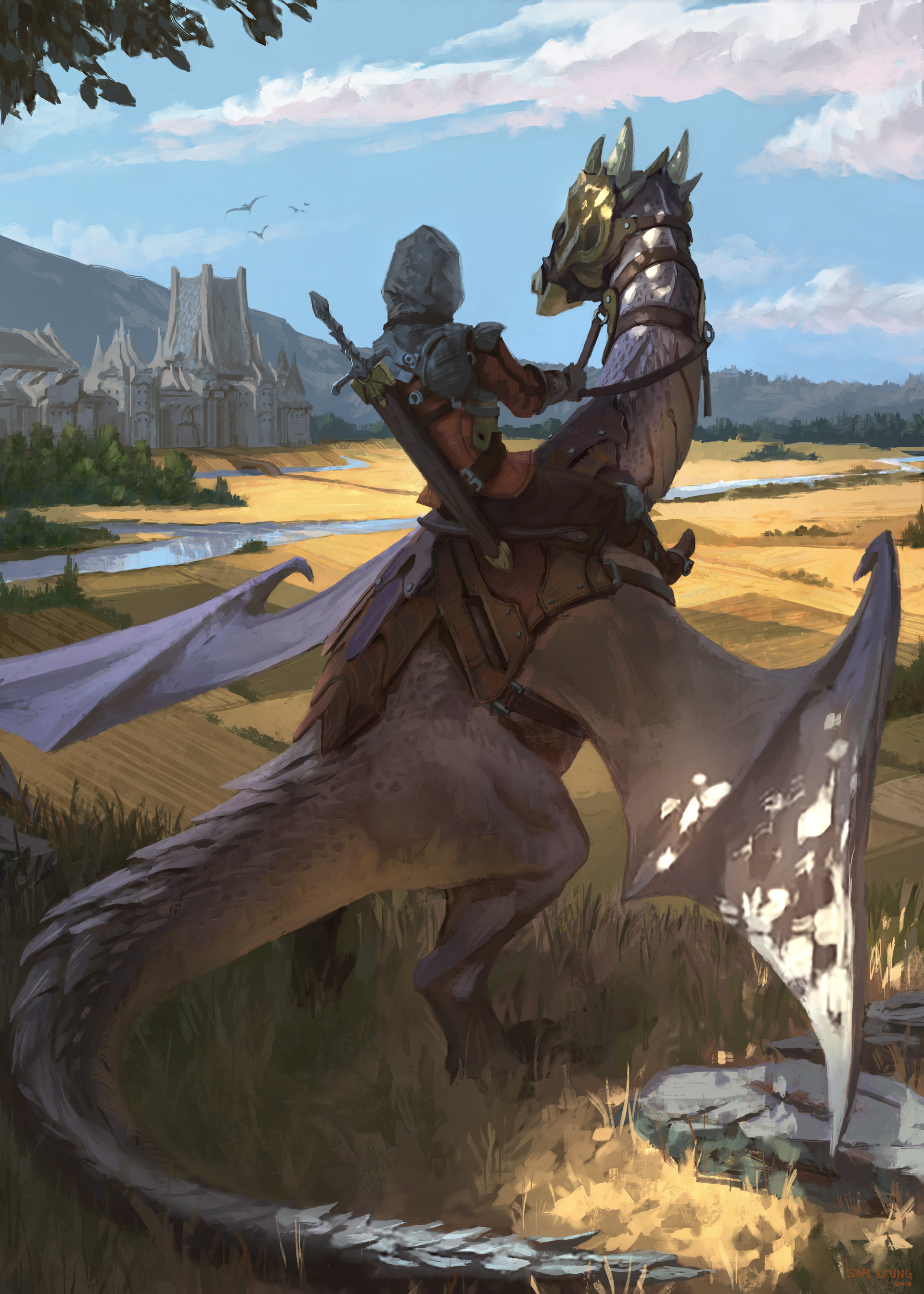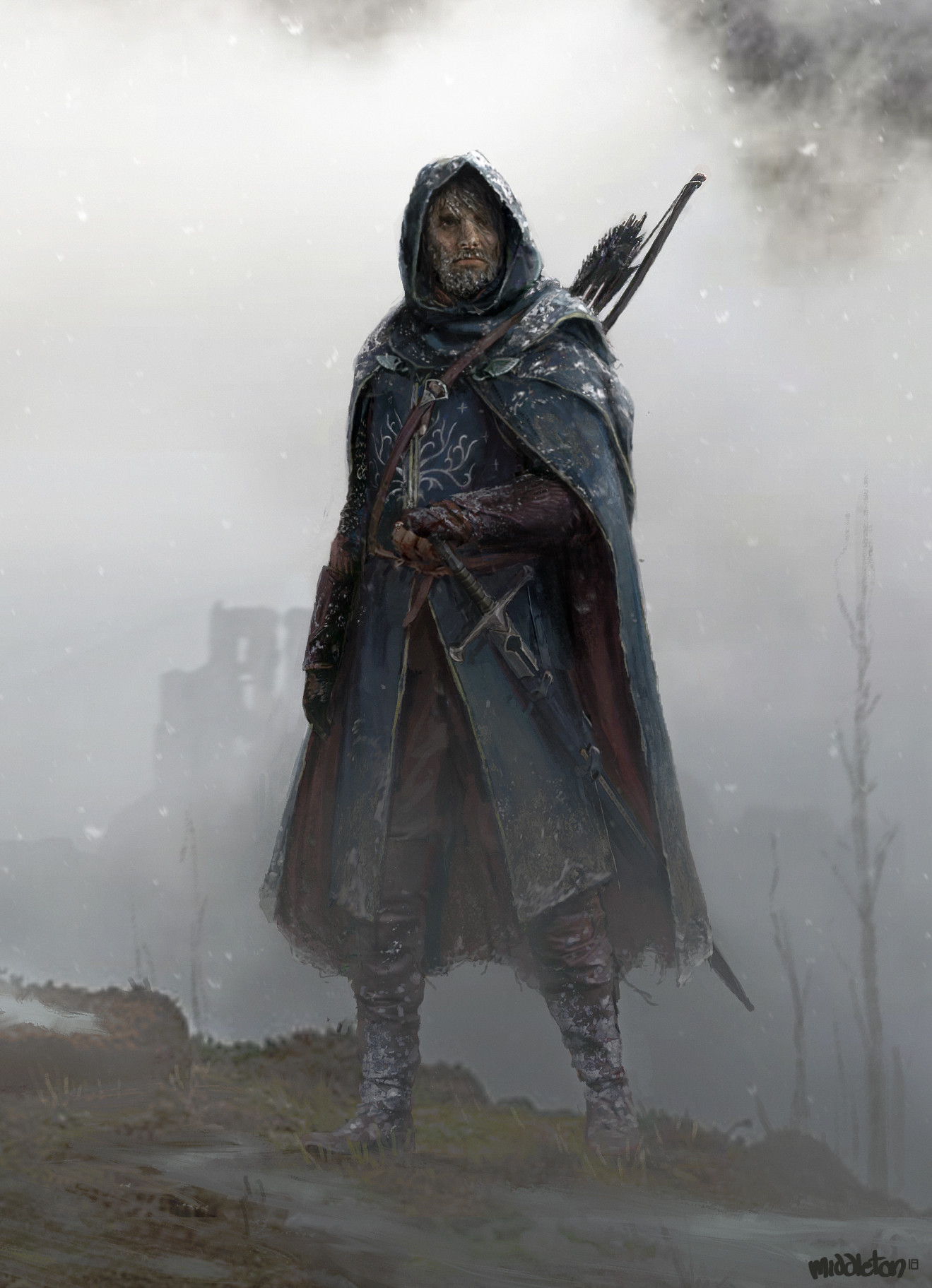
Benik's Ranger Rework
Rough and wild looking, a human stalks alone through the shadows of trees, hunting the orcs he knows are planning a raid on a nearby farm. Clutching a shortsword in each hand, he becomes a whirlwind of steel, cutting down one enemy after another.
After tumbling away from a cone of freezing air, an elf finds her feet and draws back her bow to loose an arrow at the white dragon. Shrugging off the wave of fear that emanates from the dragon like the cold of its breath, she sends one arrow after another to find the gaps between the dragon’s thick scales.
Holding his hand high, a half-elf whistles to the hawk that circles high above him, calling the bird back to his side. Whispering instructions in Elvish, he points to the owlbear he’s been tracking and sends the hawk to distract the creature while he readies his bow.
Far from the bustle of cities and towns, past the hedges that shelter the most distant farms from the terrors of the wild, amid the dense-packed trees of trackless forests and across wide and empty plains, rangers keep their unending watch.
Deadly Hunters
Warriors of the wilderness, rangers specialize in hunting the monsters that threaten the edges of civilization—humanoid raiders, rampaging beasts and monstrosities, terrible giants, and deadly dragons. They learn to track their quarry as a predator does, moving stealthily through the wilds and hiding themselves in brush and rubble. Rangers focus their combat training on techniques that are particularly useful against their specific favored foes.
Thanks to their familiarity with the wilds, rangers acquire the ability to cast spells that harness nature’s power, much as a druid does. Their spells, like their combat abilities, emphasize speed, stealth, and the hunt. A ranger’s talents and abilities are honed with deadly focus on the grim task of protecting the borderlands.
Independent Adventurers
Though a ranger might make a living as a hunter, a guide, or a tracker, a ranger’s true calling is to defend the outskirts of civilization from the ravages of monsters and humanoid hordes that press in from the wild. In some places, rangers gather in secretive orders or join forces with druidic circles. Many rangers, though, are independent almost to a fault, knowing that, when a dragon or a band of orcs attacks, a ranger might be the first—and possibly the last—line of defense. This fierce independence makes rangers well suited to adventuring, since they are accustomed to life far from the comforts of a dry bed and a hot bath. Faced with city-bred adventurers who grouse and whine about the hardships of the wild, rangers respond with some mixture of amusement, frustration, and compassion.
But they quickly learn that other adventurers who can carry their own weight in a fight against civilization’s foes are worth any extra burden. Coddled city folk might not know how to feed themselves or find fresh water in the wild, but they make up for it in other ways.
Creating a Ranger
As you create your ranger character, consider the nature of the training that gave you your particular capabilities. Did you train with a single mentor, wandering the wilds together until you mastered the ranger’s ways? Did you leave your apprenticeship, or was your mentor slain—perhaps by the same kind of monster that became your favored enemy? Or perhaps you learned your skills as part of a band of rangers affiliated with a druidic circle, trained in mystic paths as well as wilderness lore. You might be self-taught, a recluse who learned combat skills, tracking, and even a magical connection to nature through the necessity of surviving in the wilds.
What’s the source of your particular hatred of a certain kind of enemy? Did a monster kill someone you loved or destroy your home village? Or did you see too much of the destruction these monsters cause and commit yourself to reining in their depredations? Is your adventuring career a continuation of your work in protecting the borderlands, or a significant change? What made you join up with a band of adventurers? Do you find it challenging to teach new allies the ways of the wild, or do you welcome the relief from solitude that they offer?
Quick Build
You can make a ranger quickly by following these suggestions. First, make Dexterity your highest ability score, followed by Wisdom. (Some rangers who focus on two-weapon fighting make Strength higher than Dexterity.) Second, choose the outlander background.
Art & Idea Credit
This version of the Ranger draws a lot of inspiration from u/laserllama's Alternate Ranger and the Community Ranger Subbreddit's Ranger. If you don't already know about either one, do yourself a favor and check them out!
Cover Art: Lunar Ranger by Damian Ziomek
Watercolor Stains by Jared Ondricek
Disclaimer
This is unofficial Fan Content permitted under the Fan Content Policy. Not approved/endorsed by Wizards. Portions of the materials used are property of Wizards of the Coast. © Wizards of the Coast LLC.
The Ranger Table
Benik's Ranger
| Level | Proficiency Bonus | Features | Huntsman Die | Predator's Strike Maximum | 1st | 2nd | 3rd | 4th | 5th |
|---|---|---|---|---|---|---|---|---|---|
| 1st | +2 | Huntsman Die, Outstanding Explorer | d4 | — | — | — | — | — | — |
| 2nd | +2 | Fighting Style, Predator's Strike, Spellcasting | d4 | 1 | 2 | — | — | — | — |
| 3rd | +2 | Primal Connection, Ranger Conclave | d4 | 1 | 3 | — | — | — | — |
| 4th | +2 | Ability Score Improvement | d4 | 1 | 3 | — | — | — | — |
| 5th | +3 | Extra Attack | d6 | 2 | 4 | 2 | — | — | — |
| 6th | +3 | Devastating Strike | d6 | 2 | 4 | 2 | — | — | — |
| 7th | +3 | Conclave Feature | d6 | 2 | 4 | 3 | — | — | — |
| 8th | +3 | Ability Score Improvement | d6 | 2 | 4 | 3 | — | — | — |
| 9th | +4 | One with the Land | d6 | 2 | 4 | 3 | 2 | — | — |
| 10th | +4 | Superior Ambusher, Outstanding Explorer Improvement | d6 | 2 | 4 | 3 | 2 | — | — |
| 11th | +4 | Conclave Feature, Predator's Strike Improvement | d8 | 3 | 4 | 3 | 3 | — | — |
| 12th | +4 | Ability Score Improvement | d8 | 3 | 4 | 3 | 3 | — | — |
| 13th | +5 | — | d8 | 3 | 4 | 3 | 3 | 1 | — |
| 14th | +5 | Unwavering Endurance | d8 | 3 | 4 | 3 | 3 | 1 | — |
| 15th | +5 | Conclave Feature | d8 | 3 | 4 | 3 | 3 | 2 | — |
| 16th | +5 | Ability Score Improvement | d8 | 3 | 4 | 3 | 3 | 2 | — |
| 17th | +6 | Predator's Strike Improvement | d10 | 4 | 4 | 3 | 3 | 3 | 1 |
| 18th | +6 | Heightened Senses | d10 | 4 | 4 | 3 | 3 | 3 | 1 |
| 19th | +6 | Ability Score Improvement | d10 | 4 | 4 | 3 | 3 | 3 | 2 |
| 20th | +6 | Slayer of Man and Beast | d10 | 4 | 4 | 3 | 3 | 3 | 2 |
Class Features
As a Ranger, you gain the following class features
Hit Points
- Hit Dice: 1d10 per Ranger level
- Hit Points at 1st Level: 10 + Constitution modifier
- Hit Points at Higher Levels: 1d10 (or 6) + your Constitution modifier per ranger level after 1st
Proficiencies
- Armor: Light armor, medium armor, shields
- Weapons: Simple weapons, martial weapons
- Tools: one type of artisan's tools of your choice
- Saving Throws: Strength, Dexterity
- Skills: Choose three from Animal Handling, Athletics, Insight, Investigation, Nature, Perception, Stealth, and Survival
Equipment
You start with the following equipment, in addition to the equipment granted by your background:
- (a) scale mail or (b) leather armor
- (a) two shortswords or (b) two simple melee weapons
- (a) a dungeoneer’s pack or (b) an explorer’s pack
- A longbow and a quiver of 20 arrows
Huntsman Die
Your growing experience and knowledge is represented by your huntsman die. Some features allow you to add your huntsman die once or multiple times to your rolls.
As shown in the class table, your huntsman die starts out as a d4 and increases in size at levels 5, 11 and 17.
Outstanding Explorer
At 1st level, your knowledge of the wilds are unmatched. Choose one of your Ranger skill proficiencies. Your proficiency bonus is doubled for any ability check you make that uses the chosen proficiency. Also, you learn a language of your choice.
Additionally, you gain the following benefits:
- Whenever you make a check to recall information about a creature, location, plant or terrain, you can add your huntsman die to the check.
- Moving through non-magical difficult terrain doesn't cost you any extra movement.
- You have advantage on attack rolls against creatures that are currently standing in difficult terrain.
At 10th level you choose one more of your ranger proficiencies to gain this benefit and you learn another language.
Fighting Style
At 2nd level, you adopt a particular style of fighting as your specialty. Choose one of the following options.
You can’t take a Fighting Style option more than once, even if you later get to choose again.
Archery
You gain a +2 bonus to attack rolls you make with ranged weapons.
Blind Fighting
You have blindsight with a range of 10 feet. Within that range, you can effectively see anything that isn’t behind total cover, even if you’re blinded or in darkness. Moreover, you can see an invisible creature within that range, unless the creature successfully hides from you.
Defense
While you are wearing armor, you gain a +1 bonus to AC.
Druidic Warrior
You learn two cantrips of your choice from the Druid spell list. They count as Ranger spells for you, and Wisdom is your spellcasting ability for them. Whenever you gain a level in this class, you can replace one of these cantrips with another cantrip from the Druid spell list.
Dueling
When you are wielding a melee weapon in one hand and no other weapons, you gain a +2 bonus to damage rolls with that weapon.
Great Weapon Fighting
When you roll a 1 or 2 on a damage die for an attack you make with a melee weapon that you are wielding with two hands, you can reroll the die and must use the new roll, even if the new roll is a 1 or a 2. The weapon must have the two-handed or versatile property for you to gain this benefit.
Thrown Weapon Fighting
You can draw a weapon that has the thrown property as part of the attack you make with the weapon. In addition, when you hit with a ranged attack using a thrown weapon, you gain a +2 bonus to the damage roll.
Two-Weapon Fighting
When you engage in two-weapon fighting, you can add your ability modifier to the damage of the second attack.
Predator's Strike
Starting at 2nd level you know how to use your abilities to create circumstances to hit your enemies where it hurts most. Under certain conditions you inflict extra damage to your target. You can add one huntsman die to the damage of your first hit during your turn for each of the following conditions:
- You haven't attacked another target since the beginning of your last turn
- The target's movement speed is reduced
- There is no ally of your target within 5 feet of it or you
- You have advantage on the attack roll
The additional type of damage you deal is the same as your weapon's, unless specified otherwise and you can't add more than 1 huntsman dice to the attack.
Your huntsman dice maximum for predator's strike increases at certain levels as shown in the Predator's Strike Maximum column.
Spellcasting
By the time you reach 2nd level, you have learned to use the magical essence of nature to cast spells, much as a Druid does. See chapter 11 of the Player's Handbook for the general rules of spellcasting and the Ranger spell list.
Preparing and Casting Spells
The Ranger table shows how many spell slots you have to cast your spells. To cast one of your Ranger spells of 1st-level or higher, you must expend a slot of the spell's level or higher. You regain all spell slots when you finish a long rest.
You prepare the list of Ranger spells that are available for you to cast, choosing from the Ranger spell list. When you do so, choose a number of Ranger spells equal to your Wisdom modifier + half your Ranger level, rounded down. The spells must be of a level for which you have spell slots.
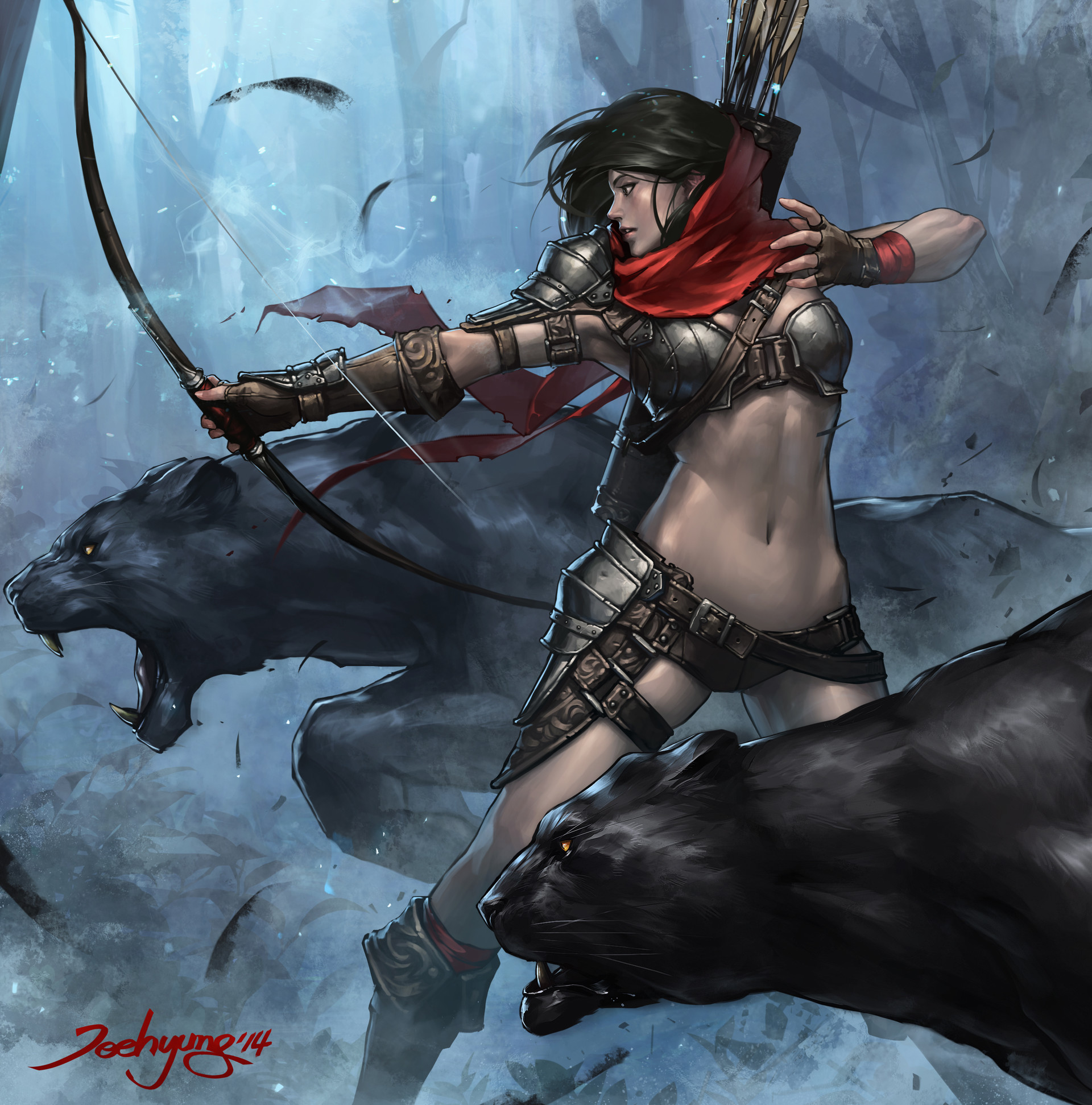

For example, if you are a 5th-level Ranger, you have four 1st-level and two 2nd-level spell slots. With a Wisdom of 14, your list of prepared spells can include four spells of 1st or 2nd level, in any combination. If you prepare the 1st-level spell cure wounds, you can cast it using a 1st-level or a 2ndlevel slot. Casting the spell doesn't remove it from your list of prepared spells. You can change your list of prepared spells when you finish a long rest.
Spellcasting Focus
You can use a druidic focus as a spellcasting focus for your Ranger spells. See chapter 5, of the Player’s Handbook for a list of things that count as druidic foci.
Ritual Casting
You can cast a Ranger spell as a ritual if that spell has the ritual tag and you have the spell prepared.
Spellcasting Ability
Wisdom is your spellcasting ability for your Ranger spells, since your magic draws on your attunement to nature. You use your Wisdom whenever a spell refers to your spellcasting ability. In addition, you use your Wisdom modifier when setting the saving throw DC for a Ranger spell you cast and when making an attack roll with one.
Untitled Beastmaster
by Jeehyung Lee
Spell Save DC
Spell attack modifier
Ranger Conclave
At 3rd level, you choose to emulate the ideals and training of a Conclave, a society of Rangers specialized in defending civilization from specific threats.
Choose one of the Conclaves detailed at the end of this class description, official options from the PHB, XGtE, TCoE and other sources have been converted to work with this version of the Ranger. Your Ranger Conclave grants you features at 3rd, 7th, 11th, and 15th level.
Primal Connection
You can focus your awareness through the interconnections of nature and always have the right tools at hand for any given situation. Once per long rest, you can cast one spell from your spell list without expending a spell slot.
You don't need to have the spell prepared, but it must be on the ranger spell list and be of a level which you can cast.
Ability Score Improvement
When you reach 4th level, and again at 8th, 12th, 16th, and 19th level, you can increase one ability score of your choice by 2, or you can increase two ability scores of your choice by 1. As normal, you can’t increase an ability score above 20 using this feature.
Using the optional feats rule, you can forgo taking this feature to take a feat of your choice instead.
Extra Attack
Beginning at 5th level, you can attack twice, instead of once, whenever you take the Attack action on your turn.
Devastating Strike
At 6th level, when you score a critical hit, you break your enemies defenses and make them susceptible to follow-up attacks. The next attack roll made against the target, made by any creature, has advantage.
One with the Land
Beginning at 9th level, your mastery of terrain grants you a climbing or swimming speed equal to your walking speed and moving through magical difficult terrain doesn't cost you any extra movement.
Superior Ambusher
Beginning at 10th level, you have learned how to conceal yourself from unwanted eyes and surprise your enemies. You can't be tracked by non-magical means unless you choose to leave a trail and you add your huntsman die to your initiative as well as to any stealth checks and all perception checks made to search for hidden creatures.
Additionally you can use your bonus action to Hide or Disengage.
Unwavering Endurance
At 14th level, you can endure even the toughest of hardships with relative ease. You gain proficiency in Constitution saving throws. If you are already proficient in them, choose either Intelligence or Charisma saving throws.
Additionally, whenever you finish a short rest, your exhaustion level, if any, is decreased by 1 and you recover from 2 levels of exhaustion during a long rest.
Heightened Senses
At 18th level, your senses exceeds that of other mortals. As long as you aren't both blinded and deafened, you have blindsight and tremorsense out to a range of 30 feet. If you are either blinded or deafened, the range is reduced to 15 feet.
Slayer of Man and Beast
At 20th level you become an apex predator, no one can keep up with your tenacious hunting spirit and you always strike true. You add your Wisdom modifier to any attack roll you make and the first attack roll on each of your turns has advantage.
Additionally, before you roll a huntsman die, you can choose to roll the maximum result possible. You can do this to a number of huntsman dice equal to 1 + your Wisdom modifier per long rest.
Beast Master
The Beast Master archetype embodies a friendship between the civilized races and the beasts of the wild. United in focus, beast and ranger fight the monsters that threaten civilization and the wilderness alike.


Beastmaster Spells
Starting at 3rd level, you learn an additional spell when you reach certain levels in this class, as shown in the Beastmaster Spells table. The spells count as ranger spells for you, but they don’t count against the number of ranger spells you can prepare.
| Ranger Level | Spell |
|---|---|
| 3rd | beast bond |
| 5th | enlarge/reduce |
| 9th | stinking cloud |
| 13th | dominate beast |
| 17th | awaken |
Primal Companion
At 3rd level, you can magically summon a primal beast, which draws strength from your bond with nature. The beast is friendly to you and your companions and obeys your commands. Choose its stat block—Beast of the Land, Beast of the Sea, or Beast of the Sky—which uses your proficiency bonus (PB) in several places. You also determine the kind of animal the beast is, choosing a kind appropriate for the stat block. Whatever kind you choose, the beast bears primal markings, indicating its mystical origin.
Garvel Lokin
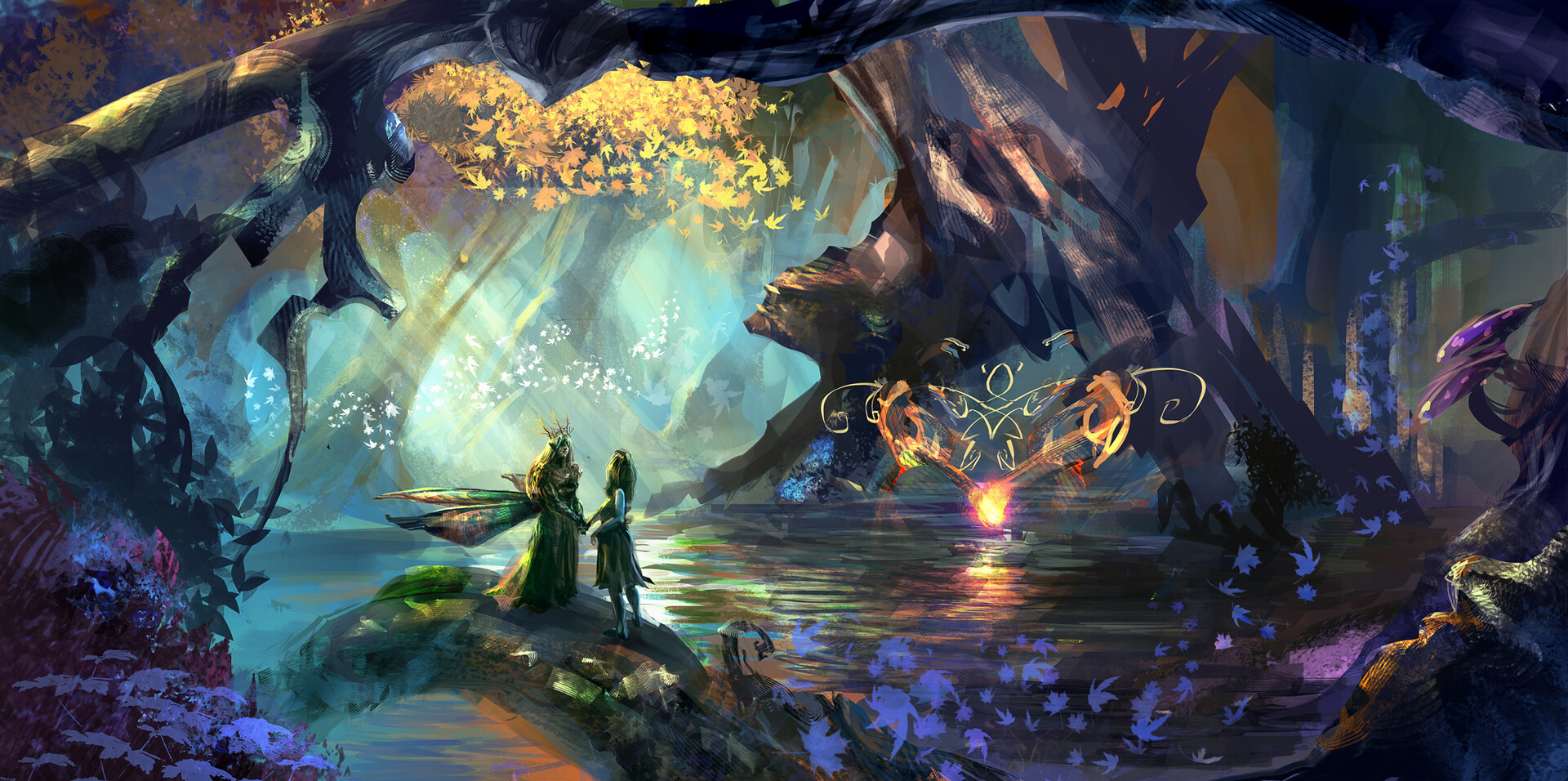

In combat, the beast acts during your turn. It can move and use its reaction on its own, but the only action it takes is the Dodge action, unless you take a bonus action on your turn to command it to take another action. That action can be one in its stat block or some other action. You can also sacrifice one of your attacks when you take the Attack action to command the beast to take the Attack action. If you are incapacitated, the beast can take any action of its choice, not just Dodge.
If the beast has died within the last hour, you can use your action to touch it and expend a spell slot of 1st level or higher. The beast returns to life after 1 minute with all its hit points restored.
When you finish a long rest, you can summon a different primal beast. The new beast appears in an unoccupied space within 5 feet of you, and you choose its stat block and appearance. If you already have a beast from this feature, it vanishes when the new beast appears. The beast also vanishes if you die.
Beast of the Land
Medium beast, neutral
- Armor Class 13 + PB (natural armor)
- Hit Points 5 + five times your ranger level (the beast has a number of Hit Dice [d8s] equal to your ranger level)
- Speed 40 ft., climb 40 ft.
STR DEX CON INT WIS CHA 14 (+2) 14 (+2) 15 (+2) 8 (-1) 14 (+2) 11 (+0)
- Senses darkvision 60 ft., passive perception 12
- Languages understands the languages you speak
- Charge. If the beast moves at least 20 feet straight toward a target and then hits it with a maul attack on the same turn, the target takes an extra 1d6 slashing damage. If the target is a creature, it must succeed on a Strength saving throw against your ranger spell save DC or be knocked prone
- Primal Bond. You can add your proficiency bonus to any ability check or saving throw that the beast makes.
Actions
Maul. Melee Attack: 1 + your spell attack modifier to hit, reach 5 ft., one target. Hit: 1d8 + 2 + PB slashing damage.
Feywild
by Tim Shepherd
Beast of the Sky
Small beast, neutral
- Armor Class 13 + PB (natural armor)
- Hit Points 4 + four times your ranger level (the beast has a number of Hit Dice [d6s] equal to your ranger level)
- Speed 10 ft., fly 60 ft.
STR DEX CON INT WIS CHA 6 (-2) 16 (+3) 13 (+1) 8 (-1) 14 (+2) 11 (+0)
- Senses darkvision 60 ft., passive perception 12
- Languages understands the languages you speak
- Flyby. The beast doesn’t provoke opportunity attacks when it flies out of an enemy’s reach.
- Primal Bond. You can add your proficiency bonus to any ability check or saving throw that the beast makes.
Actions
Shred. Melee Attack: 2 + your spell attack modifier to hit, reach 5 ft., one target. Hit: 1d4 + 3 + PB slashing damage.
Beast of the Sea
Medium beast, neutral
- Armor Class 13 + PB (natural armor)
- Hit Points 5 + five times your ranger level (the beast has a number of Hit Dice [d8s] equal to your ranger level)
- Speed 5 ft., swim 60 ft.
STR DEX CON INT WIS CHA 14 (+2) 14 (+2) 15 (+2) 8 (-1) 14 (+2) 11 (+0)
- Senses darkvision 60 ft., passive perception 12
- Languages understands the languages you speak
- Amphibious. The beast can breathe both air and water.
- Primal Bond. You can add your proficiency bonus to any ability check or saving throw that the beast makes.
Actions
Binding Strike. Melee Attack: 1 + your spell attack modifier to hit, reach 5 ft., one target. Hit: 1d6 + 2 + PB piercing damage or 1d6 + 2 + PB bludgeoning damage (your choice), and the target is grappled (ranger spell save DC to escape). Until this grapple ends, the beast can’t use this attack on another target.
Soothing Presence
At 7th level, your furry friend feels calmer when near you. While your beast companion is within 30 feet of you and can see you, it can add your huntsman die to all its saving throws.
In addition, the beast's attacks now count as magical for the purpose of overcoming resistance and immunity to nonmagical attacks and damage.
Bestial Fury
Starting at 11th level, when you use your bonus action to command your beast companion to take the Attack action, the beast can make two attacks instead of one.








